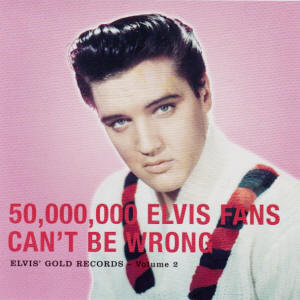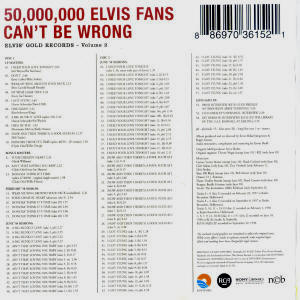

In 2007 Follow That Dream Records released a
collector's edition of the king's second "Gold"
album. It includes the tracks of the original
release, "Your Cheatin' Heart" and "Ain't That
Loving You Baby" (both had stayed in the vaults
until the mid-sixties) as well as the single
master of "Doncha' Think It's Time". Another
bonus is the content of the interview-ep "Elvis
Sales". The set is filled up with outtakes from
February and June 1958. All the recordings have
been carefully restored by Kevan Budd, who had
also remastered the tracks of the critically
acclaimed album "Elvis At Sun". FTD's
collector's edition comes in the usual format of
two compact discs and a booklet, housed in a 7"
digipak. Because FTD sticks to physical formats,
the compilation is not available on the
streaming platforms.
In this review I will only deal with the
tracks, that are not available on the regular
RCA releases of the time. For a review of the
original album, just tap
HERE.
Wear My Ring Around Your Neck
(take 22)Here we have
the undubbed master take, which means, that
guitar, percussion and piano are missing.
Your Cheatin' Heart
(take 9)
While the album "Elvis For Everyone!" featured
the 10th take, the previous attempt was labeled
as "alternate master".
Doncha' Think It's Time
(takes 39, 40, 47 & 48)
These takes were used by Steve Sholes to create
the masters. The album master starts with take
40 (until second 44 "...doncha' think it's
time"), followed by take 39 (from second 44 to
59, until "...any other guy"), then it switches
back to take 40 (from second 59 to :21 minutes,
until "...walkin' right by my side") and ends
with the finale of take 39. The single master
starts with take 47 (to 1:15 minutes, until
"...doncha' think it's time"), switches to take
40 (from 1:16 to 1:41 minutes, until "...make me
feel so fine") and the end of take 48.
A Big Hunk O' Love
(takes 1-4) The first
take sounds much tamer than the released
version. The goal is simply to archive a
complete performance. Take 2 starts with
laughter and the announcement by the sound
engineer. Elvis sounds more secure and also can
be heared during the piano part. Scotty Moore
also has found his licks by now. With the 3rd
take everybody knows what to do, now it's time
to rock. Take 4 is even better, this would have
been my choice for the master. Elvis had a
different oppinion and preferred take number 3
with the piano solo of take 4 spliced in.
Ain't That Loving You Baby
(takes 1-11)
At the time Elvis recorded eleven takes without
selecting any of them for release. In 1964 RCA
Victor put the 4th take on a single, of course
approved by the king. After Elvis' demise the
label also released a "fast master" on the album
"Reconsider Baby". It was compiled of the takes
1, 8, 9, 10 and 11. The drummer kicks off the
first take, but then the sound engineer makes
his announcement and the performance is started
again. It's not perfect, but a complete
walkthrough. During the second take Elvis messes
up the timing and has to laugh. The next attempt
lasts just a few seconds, because the king has
to laugh again. Take number four is the
performance, we know from the RCA single and the
"Gold" album. From now on the group tries a
faster tempo, but fails on the intro. Take six
lasts half a minute, before Elvis gets out of
step and has to laugh. The 7th attempt is
canceled by the sound engineer during the guitar
solo by simply turning off the equipment. Take
number 8 appears to work well, but suddenly
Elvis' voice cracks and he has to laugh. Now the
arrangement is changed again and the piano can
be heared earlier in the song. But once again
the singer gets out of step and cancels the take
by saying "I got lost". The next try is burried
by the engineer, who once again simply switches
off the equipment. Take 11 is almost complete,
but then Elvis' voice cracks again and he has to
laugh. After that, the king simply stopped to
work on "Ain't That Loving You Baby" and the
tapes were filed away.
I Need Your Love Tonight
(takes 1-18)First we
hear a part of the demo record, which was the
template for Elvis and his band. Their first
walkthrough sounds very tame and reserved. After
a minute or so the king simply stops to sing.
Take number two is nothing but the intro, the
next attempt is canceled after the first few
lines. The fourth attempt is a complete
performance. It's not as rocking as the master
and the harmony singers are arranged
differently. Take 5 is also complete, this time
the group tries to involve Ray Walker, the bass
singer of The Jordanaires, a bit more. But it
doesn't sound good. Now Elvis has to cough, the
producer announces the take. After 1.5 minutes
the engineer switches off the equipment. The 7th
attempt is a complete performance again and
already sounds very good. From now on it's all
about the details. Take number 8 suffers the
same fate as the 6th one, the engineer simply
turns off the equipment. On the 9th attempt to
record "I Need Your Love Tonight" the
percussionist tries out a drum roll. Take 10 is
another complete performance, now Ray Walker's
bass voice is put a little bit more in the back.
Because this is a mono recording, it means, that
Ray had to move away from his microphone until
the level was right. The next walkthrough is
also announced as take 10, so RCA later labeled
the previous one as "10a" and this one as "10b".
But it's nothing but a false start anyway. The
same applies to the following two attempts. Now
Elvis and his band are back on track, the takes
13 to 15 are complete performances. The 16th try
is canceled, because Elvis gets out of tune and
has to laugh. The following attempt is also
canceled, because the king hasn't regained his
seriousness yet. Finally take number 18 is not
just complete, but also regarded to be good
enough for release.
A Fool Such As I
(takes 1-9)After a
few bars of the intro, the recording equipment
is switched off. On the second take the
guitarist makes a mistake and Elvis has to
laugh. The third try works well. The performance
sounds quite stiff, but at least it's a complete
one. The king asks the engineer for a bit of
echo, but then the intro doesn't work out. Take
number 5 is a complete performance and sounds
much more relaxed than take 3. The next attempt
is canceld by the producer, the 7th try fails at
the first few bars. With take number 8 we hear
another complete performance. Now someone shouts
"Here we go!", whereupon Elvis asks "Where?".
The 9th take isn't just a complete one, but also
the one, which would finally be selected for
release.
I Got Stung
(takes 1-24) The
intro sounds a bit clumsy, but otherwise the
fast song works astonishingly well. After 1.5
minutes or so Scotty Moore makes a mistake,
whereupon Elvis intones "When Irish Eyes Are
Smiling". The second walkthrough features a bit
more guitar work, but after fourty seconds the
engineer turns off the equipment. Because Elvis
regards the sound a tad too sparse, take 3 also
includes a larger guitar part. After 1.5 minutes
the king has to laugh and cancels the take. When
he says, that he likes the song a dirty laugh
can be heared. Once again Elvis has to laugh,
after that he has trouble to find into the song.
With take number eight the group finally
archives a complete performance of "I Got
Stung". The next walkthrough isn't as
successful, it ends after 30 seconds or so. Now
Elvis and his crew have gotten the hang of it.
Take 10 is a complete performance, as well as
the following ones. On the 11th try the king
sings with more zest, take 12 is enhanced with
moanings. Number 13 isn't a lucky one, Elvis
just sings "Holy smoke...shit". As the next one
also fails, he claims "My brain is gettin'
weaker". Take 14 is another complete
performance, but on the 15th one the king gets
out of step. Attempt number 16 features a new
arrangement, because now a piano has been added.
The next take is nothing more than studio talk
and rehearsals of the first line. Take number 18
seems to work well, but right at the end Elvis
gets lost in the lyrics. "Ready on the right,
ready on the left, ready on the firing line!"
says the king. The following take 20 also sounds
very good, but now Elvis' voice cracks. The 21st
try is canceld by the producer, because the band
didn't play right. Take number 22 is a complete
performance, the following attempt ends after a
minute or so, because Elvis has to laugh. The
24th take is a satisfactory one and would be
selected for release.
Verdict
The masters had never sounded better, the
content of the extended player "Elvis Sails"
is a great bonus and it's a pure joy to hear
outtakes from the 1950s in such a great
quality.

(C) Sony Music
Entertainment / Follow That Dream Records
![]()

